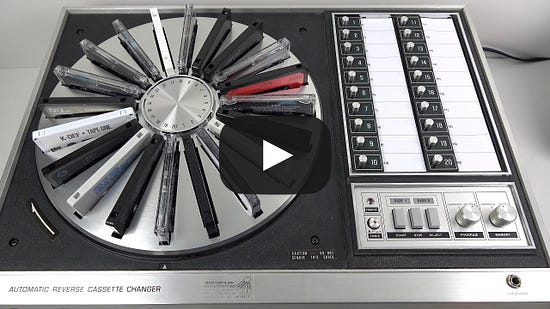The Deleted Scenes - You Never Know How It Falls Apart
I saw this article recently, and while I thought I was done with the whole pastina/manufacturing story, I guess I’m not. You really have to read the whole thing—just about every line is quotable—but the gist of it is that a complicated, high-tech, supposedly energy efficient lighting system in a Massachusetts high school failed. It was supposed to automatically adjust the lights, but the failure left the system in its default “fully on” position. In other words, all of the lights were on full brightness all of the time. For well over a year. Why? Apparently, a vital part that controlled the system’s software had failed, and lighting technicians who looked at it said the system couldn’t be altered or “patched.” The only solutions were ripping the whole thing out and replacing it, or waiting for severely backordered parts from China. Or pulling the lightbulbs out by hand. Here’s a snippet of it all:
This is the upshot:
My first thought was, things fall apart differently than they go together. And the more complicated they are, and the more they’re reliant on software, the harder it is to even figure out what’s going on. This brings together two threads that I’ve been pulling on here. One is the erosion of manufacturing capacity, the loss of engineering knowhow, and the fact that many things simply can’t be made here in America anymore. Now, there’s a data point that always comes up to the effect that America actually makes more stuff now than we used to; it’s just that we employ many fewer people. In other words, we’ve lost manufacturing jobs, but not manufacturing. Here’s an article outlining the data, and a chart from the St. Louis Fed. This dataset only goes back to 1987, so I’m not sure what it would look like going back all the way to the postwar era. It also apparently includes “food, beverages and tobacco products”—the largest single category according to Pew. This data is often used to argue that America has no manufacturing problem, but I don’t think it does that. The other thread I’ve been pulling on here is an appreciation of design, and what you might call mechanical literacy. That ties into the last piece I wrote on this subject:
Software isn’t a replacement for good design. (Ask Boeing, which learned the hard way after it launched the 737 Max, which was literally unflyable without complicated software to make up for a poorly designed airframe.) In a much lower-stakes version of this insight, look at Amazon Echo/Alexa. It isn’t really a designed and manufactured product. Well, it is—someone had to design the pretty plastic shell. But all of the guts of how it actually works are digital. Everything it does is the result of computer code. There’s nothing to it except some chips and a speaker. Here’s what’s inside of it, per a teardown video on YouTube. Most of it is hollow!  The whole device is really just a motherboard and CPU chip. In other words, a very basic computer. Everything it does can be altered/disabled by software because everything it does is software. (For example, it used to play songs by request, but now it prompts you to upgrade to Amazon Music. All you actually own when you buy this thing is the piece of plastic. Amazon could render them all paperweights tomorrow.) That, I guess, is why I appreciate stuff like this so much.  Panasonic wanted to design a stereo component that would allow you to play hours of uninterrupted music (and that wasn’t a record changer.) Nowadays, you just play your playlist, or you say, “Alexa, play classic rock music.” But in the 1970s, the solution to that goal had to be purely analog and mechanical. Think of how many actual, physical design iterations and prototypes had to be made and tested; how many different little firms making tiny parts had to be involved; how much embodied engineering knowledge that nobody really thought about much had to be there in order for a product like this to get made. Being an engineer or designer in those days, in that place, must have been kind of like being a student in college. You take it for granted, but you’re surrounded by knowledge. Libraries, professors, online resources, databases. It’s all just there, and the only limit is your interest, and you don’t notice it until it’s gone. That’s what it’s like being a manufacturing firm in the middle of a world-class industrial ecosystem. This is why I think manufacturing matters. And sometimes, the products we struggle to make will be more important than cassette players. But I also wanted to tell you more about pastina. There’s a good chance you’ve never heard of it, I think. I can’t even find it down in the D.C. area as reliably as I can in New Jersey. It’s a tiny, tiny star-shaped pasta, and it has a wonderful, almost fluffy texture when cooked and drained. It’s traditionally made with a little butter, chicken stock, and parmesan cheese, sometimes more dry and sometimes like a soup. My mother used beef bouillon paste once, and that’s about the only way I eat it myself now. My wife likes it too, but she’d never had it or seen it until I made it for us one breakfast. Several companies make it, and the rush of interest generated by the Ronzoni news has apparently put other brands on backorder. So it’s unlikely that pastina is going to ever disappear. It’s a wonderful little light meal. Go try it! Yet I’ve always wondered how many old products, particularly food products, that are out of production have actually been preserved in some way. How many of them could be made again, and might even sell well? Have some been truly lost? (Either because the recipes are gone, or the ingredients are no longer available, or the factory tooling and design notes are gone.) Is the IP behind discontinued products ever sold off, such that some snack sold in another country made by an unrelated company is actually some old 1950s American food item? Are any “new” products today secretly from the massive vault of discontinued recipes? There’s no way to know which products the future will wish to return to. When Nakamichi, the Japanese audio company behind the finest cassette players ever manufactured, was acquired in 1998, nobody would have thought that 25 years later there’d be a market for audiophile cassette decks. (A small one, to be sure, but it’s there.) Every item on the shelf is a small wonder, really, and one way to temper consumerism and the throwaway ethic is not to abstain, but rather to more deeply appreciate, and even in some way respect, the things we buy. Related Reading: Thank you for reading! Please consider upgrading to a paid subscription to help support this newsletter. You’ll get a weekly subscribers-only post, plus full access to the archive: over 500 posts and growing. And you’ll help ensure more material like this! You're currently a free subscriber to The Deleted Scenes. For the full experience, upgrade your subscription. |
Older messages
Nothing But the Chimney
Saturday, February 4, 2023
Abandonment, death, and an ethic of the built environment
New and Old #95
Friday, February 3, 2023
Friday roundup and commentary
Parking Anxiety
Thursday, February 2, 2023
How do to readjust the car-shaped mind?
Holy Living
Wednesday, February 1, 2023
What Do You Think You're Looking At? #95
Pull To Inflate
Tuesday, January 31, 2023
Lighthearted and serious thoughts on inflation, expenses, and housing
You Might Also Like
Lady Gaga Just Shut Down The Red Carpet In An Iconic Gown & WOW
Wednesday, March 19, 2025
It debuted on the runway one week ago. The Zoe Report Daily The Zoe Report 3.18.2025 Lady Gaga Just Shut Down The Red Carpet In An Iconic Gown & WOW (Celebrity) Lady Gaga Just Shut Down The Red
The Best Thing: March 18, 2025
Tuesday, March 18, 2025
The Best Thing is our weekly discussion thread where we share the one thing that we read, listened to, watched, did, or otherwise enjoyed recent… ͏ ͏ ͏ ͏ ͏ ͏ ͏ ͏ ͏ ͏ ͏ ͏ ͏ ͏ ͏ ͏ ͏ ͏ ͏ ͏ ͏ ͏ ͏ ͏ ͏ ͏ ͏ ͏
The Biggest Spring Nail Colors Give A Little Serotonin Boost
Tuesday, March 18, 2025
Blame 'Wicked'. The Zoe Report Beauty The Zoe Report 3.18.2025 (Beauty) Best Spring Nail Colors (Trends) The Biggest Spring Nail Colors Give A Little Serotonin Boost Blame 'Wicked'.
Training for More Muscle? Then You Need to Know These 4 Principles.
Tuesday, March 18, 2025
View in Browser Men's Health SHOP MVP EXCLUSIVES SUBSCRIBE Training for More Muscle? Then You Need to Know These 4 Principles. Training for More Muscle? Then You Need to Know These 4 Principles.
"Make America Healthy Again" is dead
Tuesday, March 18, 2025
There is nothing RFK Jr. can do at the Department of Health to make up for what's happening at the EPA. ͏ ͏ ͏ ͏ ͏ ͏ ͏ ͏ ͏ ͏ ͏ ͏ ͏ ͏ ͏ ͏ ͏ ͏ ͏ ͏ ͏ ͏ ͏ ͏ ͏ ͏ ͏ ͏ ͏ ͏ ͏ ͏ ͏ ͏ ͏ ͏ ͏ ͏ ͏ ͏ ͏ ͏ ͏ ͏ ͏ ͏ ͏
Kim Kardashian’s ’90s-Era Slip Dress Was A $47K Plunging Floral Masterpiece
Tuesday, March 18, 2025
Plus, Hailee Steinfeld spills the tea on her beauty routine, your daily horoscope, and more. Mar. 18, 2025 Bustle Daily Megan Moronoey's favorite beauty products and tips. BEAUTY DETAIL Megan
My 'Facial Dysmorphia' Destroyed My Ability to Be Free
Tuesday, March 18, 2025
Today in style, self, culture, and power. The Cut March 18, 2025 SELF 'My “Facial Dysmorphia” Destroyed My Ability to Be Free' For these women, staring at their own faces online has made them
Sculpt Epic Abs in 90 Days
Tuesday, March 18, 2025
special offer from men's health Our Most Intense Ab Challenge EVER! View in Browser Are you tough enough for this 90 day challenge? A seriously strong core requires getting serious about your plan
An Eater editor’s favorite small frying pans
Tuesday, March 18, 2025
The legend behind one of America's oldest burger restaurants
Genneya Walton Is Proof That Manifestations Work
Tuesday, March 18, 2025
Plus: How Steven Soderbergh made the most electrifying spy thriller of the year. • Mar. 18, 2025 Up Next Your complete guide to industry-shaping entertainment news, exclusive interviews with A-list